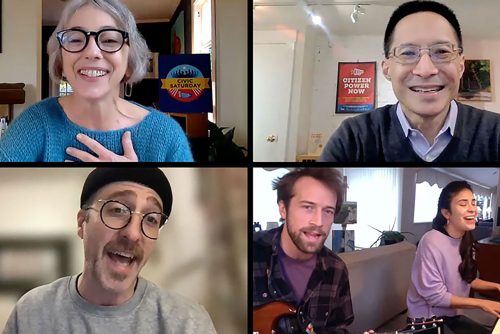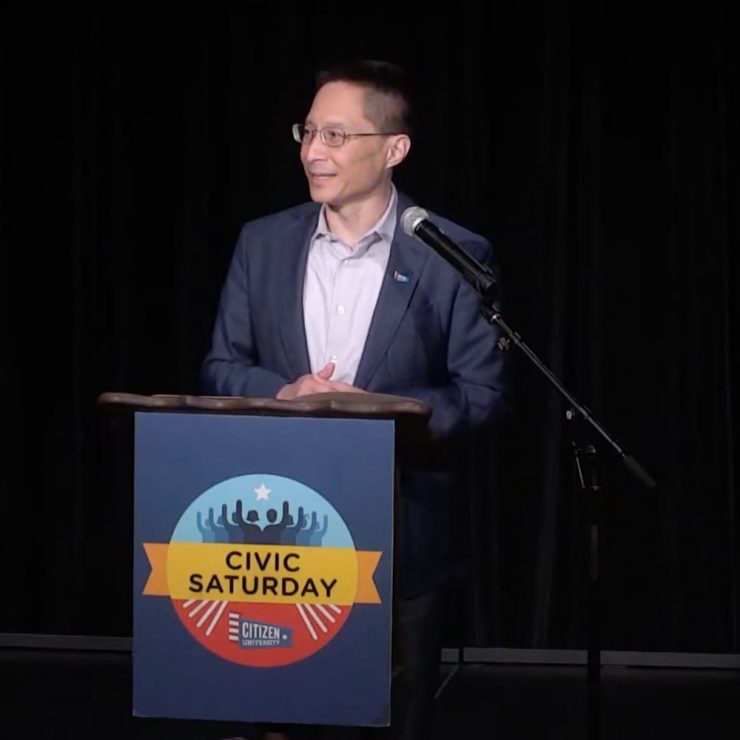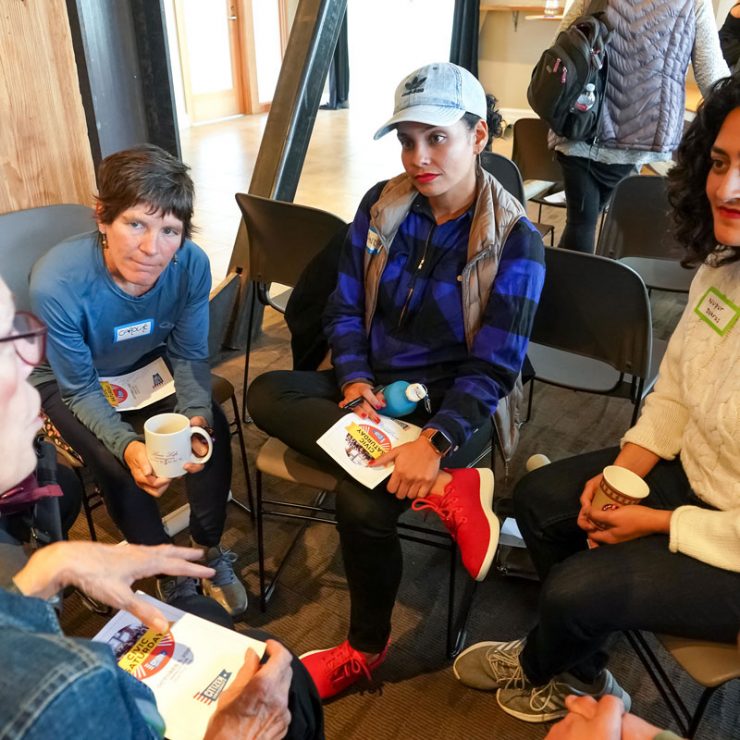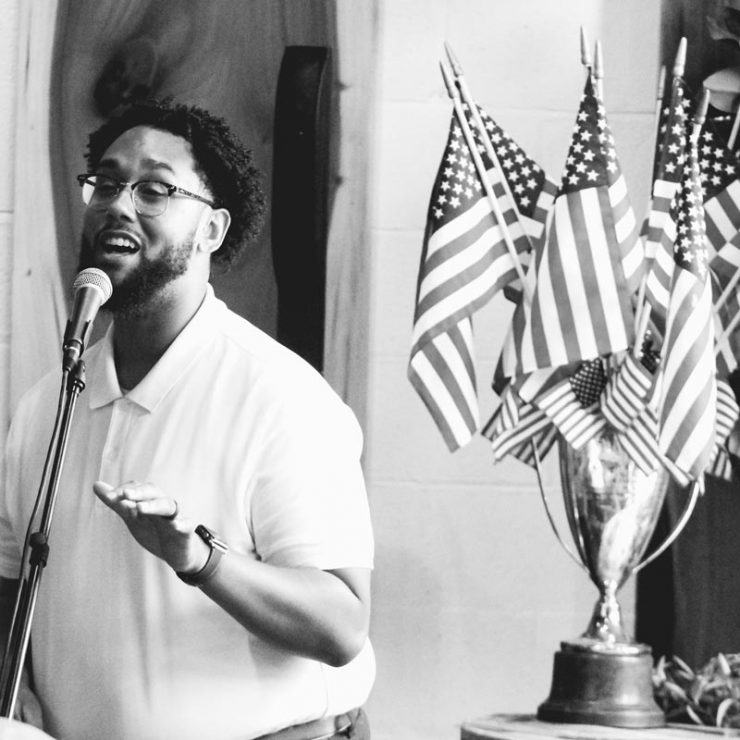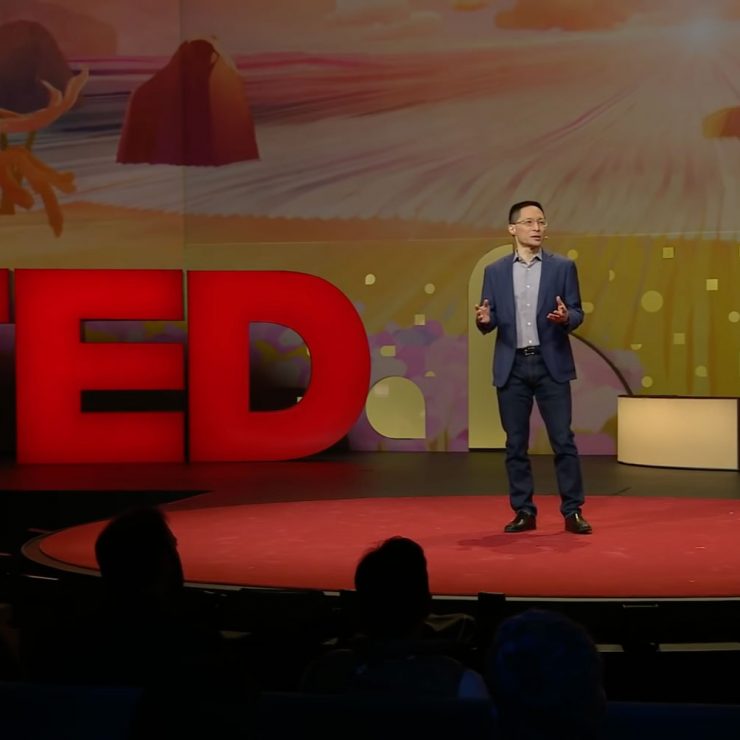Watch or read the civic sermon.
Every so often I pull this book, The Souls of Black Folk, off my shelf as a guide for navigating the times. W.E.B. Du Bois is one of my civic heroes. Author, journalist, scholar, activist, organizer, and catalyst extraordinaire, he published this book in 1903, a full generation into the betrayal of Reconstruction. Jim Crow had taken hold and hardened. People knew by then that this wasn’t a temporary setback, that this might be how it would be forever.
Our second reading of civic scripture today comes from a chapter called “The Sorrow Songs.” Those songs were the aching, organic precursors to the blues. Songs that were truly African American, that wove together strands of pain and hope and belonging and identity that belonged to no one else but those who were singing them. Songs that came to have names like You May Bury Me in the East, I Hope My Mother Will Be There, Lay This Body Down.
I was drawn to the sorrow songs because I’ve experienced a lot of it this year. I lost my mother in March; you’ve heard the trials that Jená has been through.
We have all been experiencing deep sorrow in these times — our country and all of humanity.
But I also have thought about sorrow because it is a specific form of suffering. And I have come to realize how much of our civic culture today in the United States is shaped by suffering and in particular, shaped by the desire to avoid suffering.
To avert risk. To avoid loss. To keep down the sublimated, unprocessed grief. To put out of our body the anxieties of this time — the anxiety of the pandemic, the status anxiety of shifts in power, privilege, place.
There are many ways these things play out, from rage to resignation to addiction. Today I want to focus on one response to all this pain, the one that has come to subsume all the others and seep its way into every crevice of public life.
That response is cynicism: the mindset that says all people are untrustworthy and amoral, that all systems are rigged, that trying to change any of this is a waste of time, and that acting as if values or ideals mattered is naïve and foolish.
This kind of cynicism is everywhere now, especially in the form of radical reactionaries and their enablers, people like Tucker Carlson, Mitch McConnell, Kevin McCarthy.
But putting it on these particular white men lets everyone off the hook — lets us off the hook. It’s in how trust is eroding online and off. It’s in how we assume the worst about each other based on our masks. We expect our leaders to fail us and our institutions to fail. Young people on the left think this country is done and don’t want to be bothered with the promise of American ideals, while middle-aged and and older people on the right can’t explain their struggles any way except that Democrats are a child-eating conspiracy. Fatalism and fanaticism are in the air.
The cynic acts sophisticated, like they have inside info. But really cynicism is a childish response to fear – to the fear of suffering. The fear of disappointment. The fear of losing dignity amidst powerlessness and oppression. Maybe I can inoculate myself against disappointment and failure and powerlessness if I just say it was all stacked from the beginning – against me, against fairness, against change. So why care. Why have principles. It’s just power against power, might making right, everyone lying to get theirs.
Some are cynics because they’re in the smart set. They know too much about how the game is played and so they think it’s all a game. Principles are lies to them. Being in earnest is not cool. This is much of the Beltway where I cut my teeth and spent my early career. It’s the elite national media, pundits and lobbyists. I know them. They too choose cynicism out of fear – the fear of being seen as a sucker.
Whether it’s elite or everyday, cynicism is self-fulfilling. It causes the condition that it presumes. We all know that; on some level, we want the cynicism to fulfill itself because that will then justify our choice – our surrender.
In this second December of our pandemic, more of us want to surrender. To lay this body down, the weary body politic. To give up the spirit. Today I remind us of the other choice. The choice to sing through the pain.
To find our voices. To light lights with what oil we have. To go into the woods and find a path. To live like citizens, not cynics.
The cynic versus the citizen
Let me now spell out the differences between a cynic and a citizen – and then explore how we get from the first to the second.
The cynic flattens it all – it’s all rigged, all equally bad or corrupt or racist, all pointless. The citizen walks and works the moral terrain – the valleys and peaks, persisting and discerning through the change and complexity.
The cynic does things on autopilot. The citizen does things on purpose.
The cynic is uninterested in why people act. The citizen is endlessly curious.
The cynic thinks there is no lasting truth but what power says. The citizen knows there is no lasting power but what truth says.
The cynic can’t see hypocrisy because he won’t acknowledge prior values. The citizen does see hypocrisy because he still believes in beliefs.
The cynic thinks she’s in on the joke. The citizen rewrites the script.
The cynic gets disillusioned, and stops. The citizen gets disillusioned, and replaces illusion with vision.
The cynic lets things happen. The citizen makes things happen.
The cynic detaches. The citizen attaches.
The cynic avoids. The citizen accepts.
Cynicism is born of avoidance – the avoidance of suffering; of fatigue; of shame – the shame of failure, the shame of powerlessness, the shame of ignorance. Born of avoidance, cynicism then kills: makes you lonely, antisocial, sick.
Citizenship is born of acceptance of all these same things: suffering, fatigue, shame – but then that acceptance matures. It matures into the responsibility to face those things.
And yet I sympathize with the cynic. He lives in my heart too. I am tired. I sometimes think we should blow it all up. I too want to avoid pain. Where cynicism and citizenship overlap is in that instinct for self-protection. But where the cynic chooses atomization as the path to security, the citizen chooses collective action and belonging.
Where the cynic chooses a deadening of the senses and a numbing of the nerves and a dulling of the affect, the citizen chooses to act in earnest. That may or may not mean being earnest in style. But it does mean meaning it in substance. Citizens mean it when we protest, critique, rally, compromise, build, make law, make art, make friends.
How we move from cynicism to citizenship
How, then, do we get from cynicism to citizenship? Three habits: We commit. We join. We invite. Out of that, we build power.
First, to commit. Say it out loud and commit yourself. Set an intention and act on it.
Our friend Katie Orenstein is one of the creators of the Op-Ed Project, a project that teaches people from all different walks of life, but particularly people whose voices are underrepresented in the national discourse, to write op eds. And more broadly to form their ideas and their story and their sense of self into something that is actually worth putting out there. That begins with the belief that each of us actually has something that’s worth putting out there.
Katie has a saying: If you say something of consequence, there may be consequences. But the alternative is to be inconsequential. I love that. Think about the piece of civic scripture we heard from Susan B Anthony. Talk about saying something of consequence, about knowing that there would be consequences. She was barnstorming across upstate New York, because she had already been arrested for the crime of attempted voting. And she was trying to rally people to her cause before her trial. She knew there would be consequences. But she knew as well the alternative would be to be inconsequential.
And so to commit now is to commit to doing things in earnest whatever the form is. Our Civic Saturday fellows, catalysts from across the US, are leading Civic Saturdays like this in towns across the country, in rural places and urban. Just this last election cycle, three of our recent Civic Saturday fellows exercised this habit of commitment by raising their hand and running for local office. Two of the three didn’t win, but one became a mayor in her small town in rural New Jersey. All of them decided they were going to show up and commit. To run for office is one of the least cynical things you can do. And that’s true even if your politics are of a kind that I would disagree with. Because running for office is saying, I actually do believe if I show up, the system can change and move in the direction I’d like it to go.
The second habit, for taking us from cynicism to citizenship, is to join. Isolation begets cynicism and vice versa. Coming together today is just one step, but it’s a big step.
Now I want to ask each one of you — what will you join next? What will you enter into? Maybe it will be a gardening club, or a neighborhood group. It doesn’t matter, so long as it has a humanizing spirit, an aim to unlock what’s inside our hearts and to share our hearts. That rules out some things — no Klan or QAnon or Proud Boys, OK? But the joining doesn’t have to be political or civic. It is the act of joining, the act of building the muscle of coming into a space with others, that matters and keeps cynicism at bay. Because when you join with others, you feel what we’re feeling today.
That brings me to the third and final habit to move from cynicism to citizenship: invitation.
Yesterday I spent a couple hours in a meeting that was catalyzed by another one of our Civic Saturday fellows named Shamichael Hallman. He’s the manager of a central library in Memphis, a branch that is almost 130 years old. For much of that history, he, as a Black man, would not have been allowed to enter. Shamichael is one of the great practitioners of the idea of libraries as civic assets, libraries as civic infrastructure, and in that meeting yesterday, libraries as bridges.
This meeting was an invitation to library professionals all across the United States to share tools and tricks and strategies and messages and narratives about how libraries can be more fully what we all know they already are: the one civic space left that we all trust, the one place where people across generation and race and religion, across geology and class, can walk in. And when they walk in, they become civic equals, equals in searching and learning and becoming.
This project, called Libraries as Bridges, is an invitation to library professionals to then figure out how to invite the people in their communities into these spaces and this work. Civic Saturdays are happening in libraries all over the United States. Some of our most active Civic Saturday Fellows are public library professionals. Libraries as Bridges invites people into association — to animate relationships and reanimate an institution.
We can also invite people into something as simple as friendship, which has been a theme throughout our time together today.
Another of our Civic Saturday Fellows who’s here in the room with us today, Caroline Sayre, is one of the great inviters to friendship that I know. Here in Seattle she invites friends and neighbors to regularly, joyfully go out as a crew and pick up garbage throughout the Fremont neighborhood. Caroline is, in the best sense, old school. For instance, she invites people to become friends by writing letters. She wrote a four page letter to me and Jená recently — who writes letters anymore! She wrote this letter that was about reflections on a recent gathering that we’d had of other Civic Saturday Fellows and reflections on her own sense of gratitude and grief during these times. She was writing from a part of the country where she was caring for family. She shared these things in a way that was not just about talk, but was about inviting us how to be friends again, how to learn how to be friends.
It may seem like, what does this have to do with politics? Everything, because when you invite people to be your friend, you’re saying, I will be your friend even if I don’t agree with you 100%. I will be your friend even if we’re not alike and always I will be your friend. I’ll be your friend because I’m taking a leap of faith that there’s something in both of us that’s going to hold both of us together, something we share — an aspiration, or pattern of thought, or little echoes of memory that bond us somehow.
Yet another form of invitation is an invitation to curiosity. Inviting each other to be curious and stay curious about one another.
Our friend Monica Guzman is a journalist and a leader of one of our partner organizations called Braver Angels that’s bringing together people on purpose from left and right to meet and re-humanize each other. Monica has a book that’s coming out next spring about the civic centrality of curiosity. The book is called I Never Thought of It That Way.
In this age of righteous certitude, we could all use a little bit more of, I never thought of it that way.
I never thought of you this way, I never thought of us this way. I never thought this way. That’s a habit that we have to invite each other into over and over, just as we invite people into association and friendship.
Well, out of these three habits of commitment and joining an invitation come power. A sense of shared collective character. That’s what we teach at Citizen University: Power plus character equals citizenship. This is how we get from cynicism to citizenship.
Our choices and our civic faith
Those of you dispirited by the likely demise of Roe v. Wade should take heed. The people who brought us to this place did what I just said. They committed. They joined. They invited. And they created power out of thin air through the magic act of organizing. They woke up the day after Roe was decided in 1973 and set the intention to start a multi-decade relay race of organizing and advocacy and institution-claiming. The counterrevolution – or, from their vantage point, the counter-counterrevolution – will require just that sort of effort.
That seems tiring, doesn’t it? It seems like a lot to ask. There are so many distractions.
Can you imagine how little the civil rights organizers of the 1940s, ’50s, and ’60s would have been able to achieve, or the abolitionists a century earlier, had they had Netflix and Hulu and Twitch and Tik-Tok and Disney+ and Amazon Prime and YouTube? Susan B. Anthony gave that speech we heard at the beginning in dozens of towns across the county in upstate New York where she’d been arrested and was to be tried, and she was so effective that the prosecutors sought to have her trial moved to a different jurisdiction. She focused. So did her audiences and eventually so did the male voters who ratified the 19th Amendment.
My choice this season – my way of reducing cynicism in my diet – will be to focus: to cut my TV consumption in half and my Twitter and Facebook use by 80%. It’s like my own personal Paris or Copenhagen commitment. This is how I’m going to do my part to address the civic climate crisis. But of course, as with the warming carbon-clouded planet, the solution lies not just in individual action but in systemic change.
I’m not going to lament voter suppression. I’m going to register voters and join organizations that do that work.
I’m not going to gnash my teeth at gerrymandering. I’m going to promote and champion ranked-choice voting and redistricting reform.
I’m not going to obsess over the numbness after the latest mass shooting. I’m going to add fuel to an organization I helped start, the Alliance for Gun Responsibility.
I’m not going to roll my eyes at over-woke heavy-handedness or under-informed spreaders of misinformation. I’m going to teach where I can and learn what I can.
I’m not going to critique the withdrawal from Afghanistan. I’m going to go to Welcome.US and give time, talent, treasure, and airline miles to help the Afghan refugees coming to our shores.
I’m not going to yell at national cable news and overlook what’s happening outside my window. I’m going to serve and contribute and be part of a solution here in my city.
I’m not going to let the pain and sorrow of this year shut me down. I’m going to breathe, rest, and get back to work.
Civic faith is not for the weak of heart.
Things are likely going to get darker for democracy. So let us believe that it can hold. People are likely going to get harder in their hearts. Let us be worthy of belief. We’re going to want to give up. So let us pull each other up and remember that in civic life no one can save us but us. Let’s believe that we are enough.
Things are not as bleak, after all, as when Reconstruction failed and the tide of Black progress was reversed and Jim Crow set in for 88 years. People are not as hard in their hearts as they were when McCarthyism was metastasizing or when the Fugitive Slave Act was being enforced or when American Nazis were filling up Madison Square Garden for rallies. There’s less reason to give up now than in 1777 or 1862 or 1942 or 1962.
Civic faith alone is insufficient to heal all that’s broken or to secure all that is threatened. But without it we are lost. Experiences like Civic Saturday can help us rekindle civic faith by giving us space to voice our cynicism, share our doubts – and then recommit together.
Believing requires believing that believing works. And Civic Saturday gives us the courage to do that for each other, without waiting on leaders or heroes to direct us. In the October session of our Civic Seminary, one of the Fellows named Yesenia spoke about the necessity of democratic faith, confessed the shakiness of her own faith, and then said that it felt good in the end to be “surrounded by people of faith.”
Yes, it does.
Readings of Civic Scripture to precede the Sermon
Susan B. Anthony
From “Is It a Crime for a Citizen of the United States to Vote?”
Speech delivered across upstate New York, 1873
Though the words persons, people, inhabitants, electors, citizens are all used indiscriminately in the national and state constitutions, there was always a conflict of opinion, prior to the war, as to whether they were synonymous terms…. But, whatever room there was for doubt, under the old regime, the adoption of the Fourteenth Amendment settled that question forever, in its first sentence:
“All persons born or naturalized in the United States and subject to the jurisdiction thereof, are citizens of the United States and of the State wherein they reside.”
And the second settles the equal status of all citizens:
“No State shall make or enforce any law which shall abridge the privileges or immunities of citizens; nor shall any State deprive any person of life, liberty or property, without due process of law, nor deny to any person within its jurisdiction the equal protection of the laws.”
The only question left to be settled, now, is: Are women persons? And I hardly believe any of our opponents will have the hardihood to say they are not. Being persons, then, women are citizens, and no state has a right to make any new law, or to enforce any old law, that shall abridge their privileges or immunities. Hence, every discrimination against women in the constitutions and laws of the several states, is today null and void, precisely as is every one against Negroes.
W.E.B. Du Bois
From The Souls of Black Folk
Published 1903
Through all the sorrow of the Sorrow Songs there breathes a hope—a faith in the ultimate justice of things. The minor cadences of despair change often to triumph and calm confidence. Sometimes it is faith in life, sometimes a faith in death, sometimes assurance of boundless justice in some fair world beyond. But whichever it is, the meaning is always clear: that sometime, somewhere, men will judge men by their souls and not by their skins. Is such a hope justified? Do the Sorrow Songs sing true?
